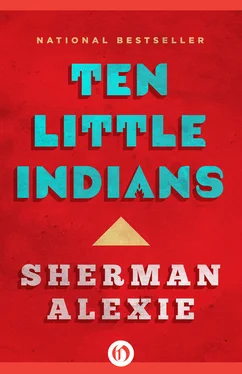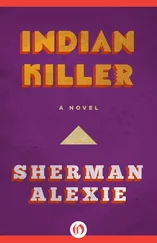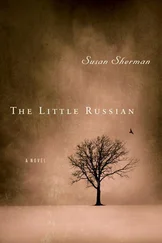Now he was forty years old, and his life could be divided into two almost equal halves: He’d been a star basketball player for eighteen years — he was a hooper right out of the womb — and a non-basketball player for twenty-two years.
After his father’s burial, Frank went home alone and stood in the quiet house. He had not yet cried for his father, and he wondered if he would ever cry, but his grief grew so suddenly huge that it pushed him to the floor. He lay on the living room carpet and wept huge and gasping tears. He screamed and wailed for ten minutes or more. He didn’t know how to sing and drum, but he pounded the floor and wailed tribal vocals: Father, way, ya, way, ha, Father, way, ya, way, ha, Father, way, ya, way, ha. He sang himself hoarse and fell asleep on the carpet. When he woke, he crawled upstairs to his father’s bedroom and lay in his father’s bed. The sheets still smelled like Harrison. Frank pressed his face into the pillow and breathed in his father’s scent. And then Frank gathered his father’s hair, so different than Frank’s graying crew cut. His father’s hair was still black and two feet long on the day he died. Frank found long black hair on the pillow, in the sheets, tangled in a comb, stuck to the bathtub porcelain, clumped into a wet ball in the drain stops, and scattered in every corner of the house. Frank gathered all of the hair, rolled it into a ball, and ate it. He felt split in two, one crazy man eating hair and one rational man watching a crazy man eat hair. He chewed and swallowed the last pieces of his father’s life. He felt like he was building a museum of pain, a freak show, where he was the only visitor viewing the only mutant screaming the only prayer he knew: Come back, Daddy. Come back, Daddy. Come back, Daddy. Come back, Daddy. Come back, Daddy. Come back, Daddy. Come back, Daddy. Come back, Daddy. Come back, Daddy. Come back, Daddy. Come back, Daddy. Come back, Daddy. Come back, Daddy. Come back, Daddy. Come back, Daddy. Come back, Daddy. Come back, Daddy. Come back, Daddy. Come back, Daddy. Come back, Daddy. Come back, Daddy. Come back, Daddy. Come back, Daddy. Come back, Daddy. Come back, Daddy. Come back, Daddy. Come back, Daddy.
Frank howled. He slept. Woke and howled again. Slept again. Woke and howled until his lips and tongue were bloody. Slept again. Woke and wondered if his grief would ever end. He didn’t know what to do, but he needed to love and be loved, so he opened his father’s closet and stared at the basketball waiting inside. A couple times a week for many years, Harrison had gone alone to the neighborhood park to shoot baskets, so the ball was worn and comfortable, low on air. Trying to move exactly like his father, to honor his father through muscle memory, Frank picked up the ball, dribbled it around his back, between his legs, bobbled it, and knocked over a chair. Clumsy and stupid with grief, he grabbed the ball, left the house, and walked then ran to the neighborhood park. Once there, he stood at the free-throw line on the northern end of the basketball court. He stared at the iron rim with its chain net. He had not taken a shot in over two decades. He’d given up this game to honor his mother, and now he was reclaiming it to honor his father. He wanted both of them to rise from the dead. Frank dribbled the ball once, twice, three times, stepped back to the three-point line, and rose into the air for a jump shot. He missed the basket completely. Frank watched the sacrilegious air ball bounce away from him and roll quickly across the manicured grass, until it finally slowed to a stop at the tennis court on the other side of the park.
A week after he buried his father, Frank quit his job as a forest ranger. He’d saved tens of thousands of dollars over the years, and the house was completely paid for, so he wasn’t worried about money. But he was worried about being alone. For most of his life, he’d loved solitude. Walking through the deep woods, he often imagined he was the only person left in the world, the only survivor of a nuclear war or a smallpox epidemic. During these fantasies, Frank lived alone for fifty years until the day when he curled into a ball at the base of a beautiful pine and died like an old dog, whereby the human race ceased to exist. Inside and outside of this fantasy, Frank knew he was guilty of arrogance and misanthropy, but he compensated by being kind to strangers and tipping really well at restaurants. He didn’t have any close friends and had probably shared more conversations with the redheaded clerk at the university bookstore and the blond cashier at the QFC supermarket than he did with anyone other than his father. As for romance, Frank had dated a few women over the years but found them to be too inconsistent and illogical, so he dated a few men and found them to be even more random and frightening. For a while, he had paid for sex with men and women, then women only, but he eventually grew disgusted with the desperation of such acts and, for many years, had lived as chastely as his father had lived. All along, Frank understood that he was suffering from a quiet sickness, a sort of emotional tumor that never grew or diminished but prevented him from living a full and messy life. At the end of every day, Frank thoroughly washed away the human funk of the world, but now, with his father’s death, he worried that he would never feel clean again. He needed to take control of his life. He needed to organize his grief; he needed to compose a mournful to-do list: Bury your father, visit your mother’s grave, cry, eat hair, play basketball again, lose weight. Of course he felt banal. In a time of extraordinary pain, why was he worried about something as ordinary as his body-fat percentage? He only knew for sure that he needed to keep moving, get stronger, build, and connect.
So he picked up the Yellow Pages, looked up personal trainers, and dialed the first one on the list.
“Athletes, Incorporated, this is Russell.”
The next day, he walked thirty blocks into downtown Seattle (why not start training immediately?) and met with Russell, a thin and muscular black man who looked more like a long-distance runner than a weight lifter.
“So,” said Russell as he sat across the desk from Frank.
“So,” Frank said.
“What can we do for you?”
“I’m not sure. I’ve never done this before.”
“Well, why don’t we start with your name.”
“I’m Frank Snake Church.”
“Damn, that’s impressive. A man with a name like that is destined for greatness.”
“If my name was John Smith, you’d tell me I was destined for greatness, right?”
“Well, I’m supposed to help you be great. That’s my job. Stronger body, stronger mind, stronger spirit. That’s our motto.”
Frank stared at Russell. Silently studied him. A confident man, Russell was comfortable with the silence.
“Are you a serious man?” Frank asked him.
“I’m not sure I understand your question.”
Frank stood and walked around the desk. He knelt beside Russell and spoke to him from inches away. Russell didn’t mind this closeness.
“Listen,” Frank said, “I know this is your job, and I know you need to make money. And I know a large part of what you do here is sales. You’re a salesman. And that’s okay. You need to make a living. We all need to make a living. And hey, this job you have is a great way to make money, right? You get to wear T-shirts and shorts all year long. And you’ve probably helped a lot of people get healthy, right?”
Russell could feel Frank’s desperation and sense of purpose, the religious fervor that needed to be directed. Russell had met a thousand desperate people, all looking to rescue or be rescued, but this Indian man was especially radiant with need.
“I keep a scrapbook of the clients who’ve meant the most to me,” Russell said. He’d never told anybody about that scrapbook and how he studied it. If exercise was his religion, then the scrapbook was his bible, and every one of his clients was a prophet. Russell never spoke aloud of how proud he was of the woman who lost five hundred pounds and kept it off, of the man who recovered from a triple bypass and now ran marathons, of the teenager paralyzed in a car wreck who now played professional wheelchair basketball. Russell fixed broken people, and sometimes the repairs lasted a lifetime. But he could not say these things aloud. In order to be taken seriously, Russell knew he had to pretend to be less than serious about his job, his calling. He could not tell his clients that he thought his gym was a church. He’d sound like a crazy fundamentalist, an idiot parody of a personal trainer. He couldn’t express sentiment or commitment; he was forced to be ironic and cynical. He couldn’t tell people he cried whenever clients failed or quit or trained too inconsistently for the work to make a difference. So he simply repeated the tired and misleading mantra whenever asked about his work: It’s better than having a real job. But now, after all these years, Russell somehow understood that he could tell the truth to this sad and desperate stranger.
Читать дальше












